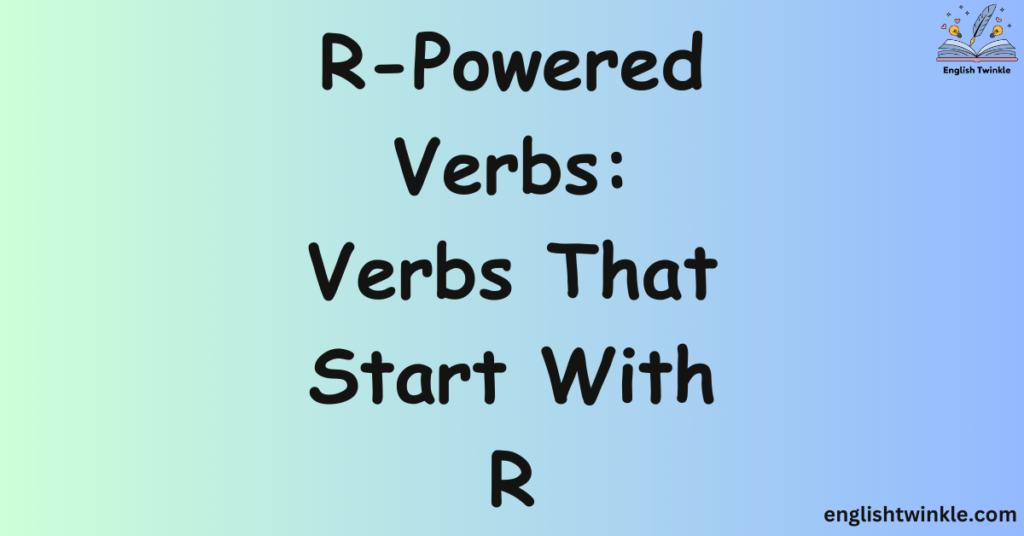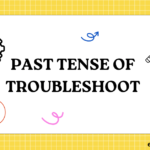Introduction
When it comes to building a richer English vocabulary, verbs that start with the letter “R” are invaluable. These verbs cover everything from routine daily actions to complex business processes and emotional expressions. Using this list of commonly used verbs that begin with R, you’ll be able to describe a vast range of activities, thoughts, and reactions. Mastering these words can sharpen your communication, whether in casual conversation or professional settings.
In this article, we’ll explore 120 commonly used verbs that start with R in English, divided into categories for ease. Each section will feature verbs related to daily routines, movement, communication, thinking, change, business, emotions, and creativity. For each category, you’ll find tables containing definitions, examples, and synonyms to help solidify your understanding. Let’s dive in and unlock the power of R-verbs to enrich your daily language and communication skills.
What Makes R-Verbs Important?
Verbs that start with R have a unique versatility. They are action words, but they also describe changes, expressions, and transitions, essential for conveying a full spectrum of meaning in English. For example, verbs like “resolve,” “respond,” and “reflect” can make sentences more engaging, offering precise ways to convey both actions and ideas.
Mastering these verbs in English allows you to navigate everyday interactions and express yourself more clearly. They bring depth to conversations and writing by allowing for nuanced expression. Whether you’re describing a business decision, a personal feeling, or a creative endeavor, R-verbs add detail and clarity. This guide will not only list these verbs but also provide example sentences and synonyms so you can see how each word is used in context.
Daily Action R-Verbs
Daily action verbs describe regular activities, from self-care to household tasks. These verbs help articulate daily routines with precision. Here’s an expanded look at verbs commonly used for daily tasks:
Personal Care Actions
These verbs capture everyday personal care activities, like cleaning or refreshing. Each verb helps convey specific self-care routines.
| Verb | Meaning | Example | Synonyms |
|---|---|---|---|
| Rinse | To wash something lightly with water | “Make sure to rinse your mouth after brushing.” | Wash, cleanse |
| Refresh | To make something feel new or invigorated | “A quick shower will refresh you.” | Revive, renew |
| Rub | To apply pressure and move something back and forth | “She rubbed lotion on her skin.” | Massage, apply |
| Relax | To make or become less tense or anxious | “Take a deep breath and relax.” | Unwind, calm |
| Rejuvenate | To make someone or something look or feel younger | “This cream claims to rejuvenate the skin.” | Revitalize, restore |
Routine Activities
These verbs express the actions involved in daily routines, from waking up to returning home.
| Verb | Meaning | Example | Synonyms |
|---|---|---|---|
| Rest | To cease work or movement in order to relax | “After a long day, I like to rest on the couch.” | Relax, unwind |
| Rise | To get up from a lying or sitting position | “I usually rise early to exercise.” | Get up, ascend |
| Return | To come back to a place | “Please return the book to the library.” | Go back, revert |
| Repeat | To do something again | “Can you repeat that instruction?” | Reiterate, echo |
| Record | To write down or register something | “She will record the meeting minutes.” | Document, log |
Household Tasks
Describing chores and tasks around the house, these verbs are useful for household discussions.
| Verb | Meaning | Example | Synonyms |
|---|---|---|---|
| Reorganize | To arrange in a new order | “It’s time to reorganize the closet.” | Rearrange, restructure |
| Repair | To fix something that is broken | “He will repair the leaky faucet.” | Fix, mend |
| Replace | To take out and put something new in its place | “We need to replace the old batteries.” | Substitute, exchange |
| Remove | To take something away from a place | “Please remove your shoes before entering.” | Eliminate, take out |
| Refresh | To update or make something new again | “I need to refresh the paint on the walls.” | Renew, renovate |
Movement R-Verbs
R-verbs that describe movement are essential for expressing directions, types of motion, and changes in position. These words are helpful in contexts ranging from casual conversations to instructions.
Forward Motion
These verbs depict movement in a forward or onward direction.
| Verb | Meaning | Example | Synonyms |
|---|---|---|---|
| Run | To move quickly on foot | “I like to run in the park every morning.” | Sprint, jog |
| Rush | To move with urgent haste | “Don’t rush; take your time.” | Hurry, speed |
| Race | To compete in a speed contest | “They decided to race each other to the finish line.” | Compete, sprint |
| Roll | To move in a circular motion | “The ball will roll down the hill.” | Rotate, spin |
| Propel | To drive or push something forward | “The boat is propelled by a motor.” | Drive, push |
Circular Motion
These verbs describe actions involving circular or spinning movements.
| Verb | Meaning | Example | Synonyms |
|---|---|---|---|
| Rotate | To turn around a central point | “The Earth rotates on its axis.” | Spin, turn |
| Revolve | To move in a circular orbit | “The planets revolve around the sun.” | Orbit, circle |
| Roll | To move by turning over and over | “She rolled the dough flat.” | Turn, spin |
| Pivot | To turn or rotate around a point | “He had to pivot quickly to avoid the obstacle.” | Spin, turn |
| Cycle | To move or pass through a series of events | “The seasons cycle from summer to winter.” | Rotate, turn |
Directional Changes
When movements change direction, these verbs come into play.
| Verb | Meaning | Example | Synonyms |
|---|---|---|---|
| Reverse | To move backward | “He had to reverse the car into the driveway.” | Backtrack, retreat |
| Redirect | To change the direction of something | “They had to redirect the flow of traffic.” | Reroute, divert |
| Retreat | To withdraw from a situation | “The army had to retreat to regroup.” | Withdraw, back off |
| Shift | To move or change position | “I need to shift my focus to other projects.” | Change, adjust |
| Depart | To leave, especially on a journey | “The train will depart at 5 PM.” | Leave, exit |
Communication R-Verbs
Communication verbs that start with “R” help convey how we express, request, and document information. These words are useful in both personal and professional contexts.
Directional Changes
These verbs focus on the spoken aspects of communication, from asking to responding.
| Verb | Meaning | Example | Synonyms |
|---|---|---|---|
| Request | To ask formally | “She requests a leave of absence.” | Ask, petition |
| Recite | To repeat aloud | “He recites the poem from memory.” | Quote, speak |
| Respond | To reply or react | “He responds to the question.” | Answer, reply |
| Redirect | To change the direction of something | “The teacher redirects the conversation.” | Reorient, guide |
| Retrace | To go back over a path or steps taken | “She retraces her steps to find her lost keys.” | Backtrack, revisit |
Writing
For writing activities, these verbs convey how we document, report, or register information.
| Verb | Meaning | Example | Synonyms |
|---|---|---|---|
| Record | To write down information | “Please record your observations in the notebook.” | Log, document |
| Register | To write down formally or officially | “You must register your car with the DMV.” | Enroll, sign up |
| Report | To give a spoken or written account of something | “She will report the findings to the committee.” | Inform, notify |
| Recite | To repeat aloud from memory | “He can recite the poem perfectly.” | Repeat, narrate |
| Reveal | To make something known that was previously hidden | “The magician will reveal his secrets.” | Disclose, uncover |
Expression
These verbs focus on conveying emotions or ideas beyond simple words.
| Verb | Meaning | Example | Synonyms |
|---|---|---|---|
| Represent | To stand in for or symbolize | “He will represent our team at the conference.” | Symbolize, embody |
| Reveal | To make known something hidden | “She revealed her true feelings.” | Disclose, unveil |
| Relay | To pass on information | “Please relay this message to him.” | Convey, transmit |
| Express | To convey thoughts or feelings | “She expressed her gratitude sincerely.” | Communicate, articulate |
| Indicate | To point out or show | “He will indicate the correct path to follow.” | Show, signify |
Mental R-Verbs
Mental Verbs That Start With R describe actions related to thought processes, understanding, and learning. These are crucial for capturing the nuances of cognition.
Thinking
For analytical and reflective thought, these verbs provide precision.
| Verb | Meaning | Example | Synonyms |
|---|---|---|---|
| Reason | To think logically or critically | “You need to reason through the problem carefully.” | Think, deduce |
| Reflect | To think deeply or carefully about something | “I often reflect on my experiences.” | Contemplate, ponder |
| Realize | To become aware of something | “I just realized I forgot my keys.” | Understand, recognize |
| Analyze | To examine in detail | “You should analyze the data before making a decision.” | Examine, assess |
| Imagine | To form a mental image of something | “Can you imagine living in a different country?” | Visualize, envision |
Learning
Learning-related verbs capture actions like studying and reviewing information.
| Verb | Meaning | Example | Synonyms |
|---|---|---|---|
| Read | To look at and understand written words | “I love to read books in my spare time.” | Peruse, scan |
| Research | To investigate thoroughly | “We need to research the topic for our report.” | Study, explore |
| Review | To go over something again | “I will review my notes before the test.” | Examine, analyze |
| Discover | To find out something for the first time | “I discovered a new café downtown.” | Uncover, find |
| Learn | To gain knowledge or skills | “I want to learn a new language.” | Acquire, master |
Understanding
These verbs indicate recognition, recall, and comprehension.
| Verb | Meaning | Example | Synonyms |
|---|---|---|---|
| Recognize | To identify someone or something | “I didn’t recognize you with that haircut!” | Identify, acknowledge |
| Recall | To remember something | “I can’t recall his name right now.” | Remember, retrieve |
| Comprehend | To understand fully | “She can comprehend complex topics easily.” | Grasp, understand |
| Interpret | To explain the meaning of something | “How do you interpret this poem?” | Explain, elucidate |
| Conclude | To reach a decision or opinion | “I conclude that we need a new strategy.” | Deduce, infer |
Change R-Verbs
Change-related Verbs That Start With R illustrate transformations, both physical and conceptual, covering a range of modifications and adjustments.
Physical Transformation
These verbs describe physical changes, often with an element of re-formation.
| Verb | Meaning | Example | Synonyms |
|---|---|---|---|
| Remodel | To change the structure or form | “We plan to remodel the kitchen this year.” | Renovate, alter |
| Reinvent | To change something so much that it appears new | “He wants to reinvent himself after the move.” | Transform, renew |
| Reshape | To shape again or differently | “You can reshape the clay into any form you like.” | Recast, reform |
| Rebuild | To build something again | “After the storm, we need to rebuild the shed.” | Restore, reconstruct |
| Refine | To improve by making small changes | “We should refine our approach to the problem.” | Improve, perfect |
State Changes
These verbs describe changes in state or condition.
| Verb | Meaning | Example | Synonyms |
|---|---|---|---|
| Reduce | To make smaller or less in amount | “We need to reduce waste in our processes.” | Decrease, diminish |
| Revert | To return to a previous state | “The changes will revert after a week.” | Return, go back |
| Restore | To bring back to a former condition | “They will restore the old building.” | Repair, recover |
| Renew | To make new or fresh again | “Let’s renew our commitment to the project.” | Revive, refresh |
| Transform | To change completely in form or appearance | “The caterpillar will transform into a butterfly.” | Change, convert |
Modification
These verbs capture actions related to adjusting, editing, or revising.
| Verb | Meaning | Example | Synonyms |
|---|---|---|---|
| Reform | To make changes to improve | “We need to reform the education system.” | Change, amend |
| Revise | To re-examine and make alterations | “I’ll revise the document before submission.” | Edit, update |
| Replace | To take out and put something new in its place | “We will replace the old equipment.” | Substitute, exchange |
| Adjust | To change something slightly | “You may need to adjust the settings for better performance.” | Modify, adapt |
| Alter | To change or modify | “He decided to alter his plans for the weekend.” | Change, modify |
Business R-Verbs
In the world of business, R-verbs are indispensable, helping to articulate management actions, financial terms, and administrative tasks. These verbs often carry formal and professional tones, making them suitable for corporate environments. Let’s break down the essential business-related R-verbs into three categories: management, finance, and administration.
Management
These verbs describe actions related to organizing and directing within a company or team.
| Verb | Meaning | Example | Synonyms |
|---|---|---|---|
| Regulate | To control or maintain the rate of something | “The government will regulate the industry.” | Control, manage |
| Review | To assess or evaluate | “The board will review the proposal next week.” | Examine, assess |
| Reorganize | To arrange in a new order | “We will reorganize the team for better efficiency.” | Rearrange, restructure |
| Reinforce | To strengthen or support | “The manager will reinforce the new policy.” | Strengthen, bolster |
| Refine | To improve by making small changes | “They will refine their processes for better results.” | Improve, enhance |
Finance
These verbs pertain to financial transactions and management, crucial for accounting and budget discussions.
| Verb | Meaning | Example | Synonyms |
|---|---|---|---|
| Revenue | To generate income | “The new project aims to revenue through sales.” | Income, earnings |
| Reduce | To lessen the amount | “We need to reduce expenses this quarter.” | Decrease, minimize |
| Reinvest | To invest again | “It’s wise to reinvest your profits for growth.” | Reallocate, invest |
| Reassess | To evaluate again | “It’s time to reassess our financial strategies.” | Review, evaluate |
| Refund | To return money to someone | “They will refund your ticket if you cancel.” | Reimburse, repay |
Administration
Administrative R-verbs cover a variety of record-keeping and organizational tasks.
| Verb | Meaning | Example | Synonyms |
|---|---|---|---|
| Regulate | To control or maintain order | “The agency will regulate the new laws.” | Control, manage |
| Register | To officially record information | “You need to register for the conference online.” | Enroll, sign up |
| Report | To give a formal account of something | “You must report any issues to the manager.” | Inform, notify |
| Respond | To answer or reply | “Please respond to the email by tomorrow.” | Reply, react |
| Reconcile | To make consistent or compatible | “We need to reconcile our accounts monthly.” | Settle, harmonize |
Each of these verbs is essential for business communication, providing clarity in specific actions taken by teams, departments, or organizations.
Emotional R-Verbs
Emotions are often complex to describe, but emotional R-verbs offer precision. These verbs range from positive feelings to negative reactions, covering a wide range of emotional responses. Let’s examine some of the most commonly used R-verbs for emotions in English.
Positive Feelings
These verbs articulate pleasant or favorable emotions and reactions.
| Verb | Meaning | Example | Synonyms |
|---|---|---|---|
| Relish | To enjoy greatly | “She relished the opportunity to travel.” | Enjoy, savor |
| Radiate | To emit or give off | “He radiated happiness on his wedding day.” | Emit, spread |
| Rejoice | To feel great joy | “They rejoiced at the good news.” | Celebrate, delight |
| Renew | To restore or revitalize | “The vacation helped renew my energy.” | Refresh, revive |
| Relax | To make or become less tense or anxious | “Take a moment to relax and breathe.” | Unwind, calm |
Negative Feelings
Expressing negative emotions, these verbs convey feelings like regret or discontent.
| Verb | Meaning | Example | Synonyms |
|---|---|---|---|
| Resent | To feel bitterness or indignation | “She began to resent the constant demands.” | Dislike, begrudge |
| Regret | To feel sad or disappointed over something | “I regret not studying harder.” | Lament, rue |
| Reject | To refuse to accept or agree to | “He decided to reject the offer.” | Dismiss, decline |
| Reluctance | To be unwilling or hesitant | “There was reluctance to try something new.” | Hesitance, unwillingness |
| Resign | To accept something unpleasant that cannot be changed | “He had to resign himself to the situation.” | Submit, acquiesce |
Reactions
Reactions express responses to situations, whether agreeing, resisting, or accepting.
| Verb | Meaning | Example | Synonyms |
|---|---|---|---|
| React | To respond to a stimulus | “How did she react to the news?” | Respond, reply |
| Respond | To reply or answer | “They will respond to your inquiry shortly.” | Reply, answer |
| Relate | To establish a connection | “I can relate to your feelings.” | Connect, associate |
| Rebound | To spring back after hitting something | “The ball will rebound off the wall.” | Bounce, spring |
| Recoil | To spring back in fear or disgust | “He recoiled at the sight of the spider.” | Flinch, withdraw |
Each of these verbs is essential for expressing a range of emotions, whether discussing feelings with friends or exploring deeper emotional reactions in writing.
Creative R-Verbs
Creative R-verbs offer expressive language for the arts, innovation, and making. These verbs are versatile and imaginative, making them ideal for discussions related to design, art, or any form of creation.
Making
These verbs capture the process of making or crafting something from scratch.
| Verb | Meaning | Example | Synonyms |
|---|---|---|---|
| Raise | To lift or elevate | “She will raise the flag in the morning.” | Lift, elevate |
| Render | To cause to become | “The news rendered him speechless.” | Make, cause |
| Reproduce | To make a copy or representation | “They plan to reproduce the artwork.” | Copy, duplicate |
| Rebuild | To construct again | “They need to rebuild the damaged structure.” | Restore, reconstruct |
| Refurbish | To renovate and redecorate | “They will refurbish the old theater.” | Renovate, restore |
Artistic
Artistic R-verbs describe modifications or creative changes to existing works.
| Verb | Meaning | Example | Synonyms |
|---|---|---|---|
| Render | To create or represent artistically | “The artist will render the scene in oil paint.” | Depict, portray |
| Recreate | To create again in a new form | “They aim to recreate the atmosphere of the era.” | Replicate, simulate |
| Revise | To alter or improve | “The director will revise the script for clarity.” | Edit, modify |
| Reinterpret | To give a new or different meaning | “The artist will reinterpret the classic piece.” | Redefine, revise |
| Reshape | To change the form or structure | “The sculpture will reshape the concept of beauty.” | Reform, modify |
Innovation
For actions related to invention or renovation, these verbs express transformation and creativity.
| Verb | Meaning | Example | Synonyms |
|---|---|---|---|
| Revolutionize | To bring about a dramatic change | “This technology will revolutionize the industry.” | Transform, change |
| Reimagine | To visualize something in a new way | “The designer will reimagine the traditional style.” | Redesign, rethink |
| Reinvent | To change something so much that it appears new | “She wants to reinvent the marketing strategy.” | Transform, renew |
| Refine | To improve by making small changes | “They aim to refine their approach to innovation.” | Enhance, perfect |
| Rethink | To reconsider or think again | “We need to rethink our priorities for the project.” | Reassess, reconsider |
These creative R-verbs bring depth and color to language related to artistry and invention, ideal for writers, designers, and anyone involved in the creative process.
Common Usage Guide
Understanding verb forms, conjugations, and common sentence structures is essential for effectively using these R-verbs. Here, you’ll find practical guidance on verb forms and examples, along with tips for common combinations to make your speech and writing more fluent.
Verb Forms and Conjugation
R-verbs in English typically follow standard conjugation rules, with most adding -ed for past forms and -ing for continuous forms. However, some, like “run,” have irregular past forms (ran) or participles (running).
Examples:
- Present: I run every day.
- Past: Yesterday, I ran for an hour.
- Future: I will run tomorrow.
- Continuous: I am running now.
Example Sentences and Common Combinations
Below are R-verbs used in common expressions, each offering practical ways to incorporate these words into everyday language.
- Regret deeply – “She regrets deeply not taking the chance.”
- React positively – “They react positively to the proposal.”
- Reinforce ideas – “The examples reinforce his arguments.”
Using these verbs in sentences helps solidify their meanings and makes them easier to remember.
Practice Section
Practice makes perfect, especially when building vocabulary. Here are some exercises to help reinforce these R-verbs:
- Fill in the Blank – Use verbs like refresh, reorganize, and recruit to complete sentences about daily routines or work-related scenarios.
- Sentence Creation – Try creating sentences using verbs like realize, reflect, and reform to explore mental actions and changes.
- Context Usage – Think of specific situations, such as describing a meeting, a creative project, or an emotional reaction, and use the relevant R-verbs to capture your ideas clearly.
This practice section helps ensure that the vocabulary sticks and makes you more confident in applying these verbs.
Conclusion
The Top 120 Commonly Used Verbs That Start With R cover an incredible range of actions, thoughts, and expressions in English. From daily routines to business actions, mental processes, creative pursuits, and emotional responses, each of these verbs brings specific meaning and detail. Mastering them allows for richer and more precise communication in every area of life.
Sources
Merriam-Webster Dictionary
The Merriam-Webster Dictionary provides comprehensive definitions, usage examples, and synonyms for English verbs, including those that start with “R.” It’s a valuable source for understanding word meanings and contexts.
Cambridge Dictionary
Cambridge Dictionary is well-regarded for its accessible definitions, examples, and usage notes, particularly helpful for English learners. The site offers in-depth entries for verbs and how they fit into sentence structures.
WordHippo
WordHippo is a versatile resource for synonyms, antonyms, and example sentences. It’s especially useful for finding alternative words and understanding different forms of verbs.
Grammarly Blog
Grammarly’s blog covers detailed language insights, including lists of action verbs, grammar rules, and vocabulary expansion tips. This is helpful for contextual examples and linguistic explanations.
ThoughtCo – English Grammar and Vocabulary
ThoughtCo provides educational articles on English grammar, vocabulary lists, and verb usage. It’s a helpful source for English language learners looking to expand their vocabulary.

Freck John, linguist and English educator, shares grammar insights and writing tips at English Twinkle, making language concepts accessible to all learners.







